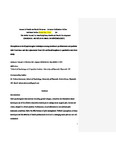Knowledge and attitudes among healthcare workers and patients with total knee and hip replacement towards the use of brief psychological techniques: A qualitative study in UK and Saudi hospitals
| dc.contributor.author | Alsanaani, T | |
| dc.contributor.author | Norman, Alyson | |
| dc.contributor.author | Whalley, Ben | |
| dc.date.accessioned | 2021-08-05T13:13:39Z | |
| dc.date.issued | 2021-02-18 | |
| dc.identifier.issn | 2499-2240 | |
| dc.identifier.issn | 2499-5886 | |
| dc.identifier.uri | http://hdl.handle.net/10026.1/17403 | |
| dc.description.abstract |
Introduction: Brief psychological interventions, including guided imagery, relaxation, and distraction-based techniques, can be effective adjunctive techniques to manage acute surgical pain, but are not widely adopted in clinical practice. Furthermore, mixed adherence to conventional pain treatments sometimes limits the effectiveness of pain management. Patients’ perceptions of these techniques, and the attitudes of health professionals involved in managing acute pain, are not sufficiently well understood to inform research or policy. Methods: Key informants such as 58 patients and 20 healthcare professionals in two Orthopedic departments in the UK and Saudi Arabia, were interviewed. Patient interviews were conducted at three distinct points in their care: Before surgery (T1), on the ward (T2), and several weeks after surgery (T3). A thematic analysis explored participants’ perceptions, understanding and acceptance of brief psychological interventions (BPIs) for acute pain after surgery. Results: Most patients expressed favorable opinions towards BPIs. These opinions were often linked to concerns about painkillers including side effects, tolerance, or dependence. Many patients reported the spontaneous practice of non-drug interventions to cope with their pain. Interviews also revealed numerous barriers to the delivery of BPIs in mainstream clinical practice including lack of knowledge and expertise among healthcare workers (HCWs), and prejudice associated with psychological treatments. HCWs were positive towards the use of BPIs in principle but highlighted a perceived lack of scientific evidence and lack of time and resources as the primary barriers to broader adoption. Conclusion: Our findings provide insights into the perception of psychological interventions for acute pain among patients and healthcare professionals, and provide a foundation for the design, evaluation and dissemination of future BPIs for postoperative pain relief. A better understanding of perceived barriers to use will inform the structure and presentation of future BPI packages. Future evaluation studies using structured, well-documented interventions that are designed for ease of dissemination are required. | |
| dc.format.extent | 41-58 | |
| dc.language.iso | en | |
| dc.title | Knowledge and attitudes among healthcare workers and patients with total knee and hip replacement towards the use of brief psychological techniques: A qualitative study in UK and Saudi hospitals | |
| dc.type | journal-article | |
| dc.type | Journal Article | |
| plymouth.issue | 1 | |
| plymouth.volume | 6 | |
| plymouth.publication-status | Published | |
| plymouth.journal | The Italian Journal for Interdisciplinary Health and Social Development | |
| dc.identifier.doi | 10.19204/2021/knwl9 | |
| plymouth.organisational-group | /Plymouth | |
| plymouth.organisational-group | /Plymouth/Faculty of Health | |
| plymouth.organisational-group | /Plymouth/REF 2021 Researchers by UoA | |
| plymouth.organisational-group | /Plymouth/REF 2021 Researchers by UoA/UoA04 Psychology, Psychiatry and Neuroscience | |
| plymouth.organisational-group | /Plymouth/Research Groups | |
| plymouth.organisational-group | /Plymouth/Research Groups/Centre for Brain, Cognition and Behaviour (CBCB) | |
| plymouth.organisational-group | /Plymouth/Research Groups/Centre for Brain, Cognition and Behaviour (CBCB)/Behaviour | |
| plymouth.organisational-group | /Plymouth/Users by role | |
| plymouth.organisational-group | /Plymouth/Users by role/Academics | |
| dcterms.dateAccepted | 2021-02-18 | |
| dc.rights.embargodate | 2021-8-25 | |
| dc.identifier.eissn | 2499-5886 | |
| dc.rights.embargoperiod | Not known | |
| rioxxterms.versionofrecord | 10.19204/2021/knwl9 | |
| rioxxterms.licenseref.uri | http://www.rioxx.net/licenses/all-rights-reserved | |
| rioxxterms.licenseref.startdate | 2021-02-18 | |
| rioxxterms.type | Journal Article/Review |


